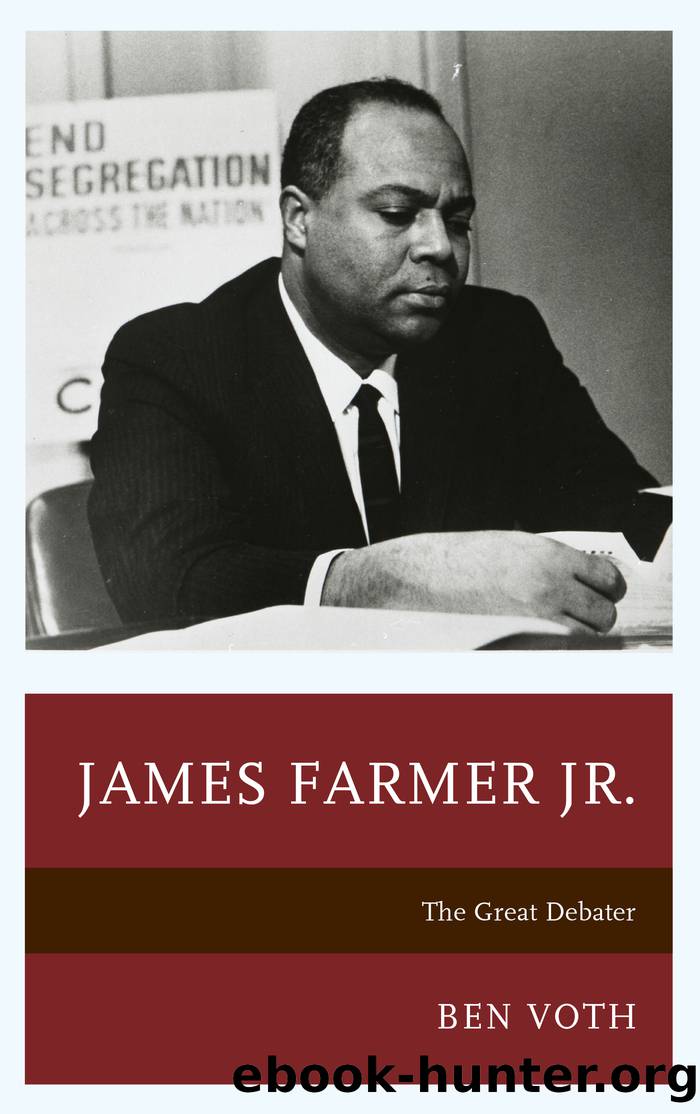James Farmer Jr. by Ben Voth

Author:Ben Voth
Language: eng
Format: epub
Tags: undefined
Publisher: Lexington Books
Published: 2012-08-15T00:00:00+00:00
Farmerâs vision and the larger Civil Rights Movement were jarred by the deaths of activists James Chaney, Mickey Schwerner, and Andrew Goodman less than a year after the pivotal March on Washington. Schwerner and Chaney were CORE members. As an African-American from Mississippi, Chaney was an important figure in the famous trio that would ultimately pay with their lives for their idealism. Chaney knew the local conditions better than the northern activists like Goodman and Schwerner. Upon discovery by the FBI, the first phone call was to James Farmer Jr.: âThese were your men,â they told him.[21]
Mississippi refused to prosecute anyone for the murders, and the long weeks of escalating media coverage proved to be a watershed moment in national agony over Southern segregation. The State of Mississippi held that no crime had been committed, and that their deaths constituted a message and argument that these killings were organic to the functions of the state of Mississippi. Mississippi had in 1956 established the Mississippi State Sovereignty Commission in the aftermath of Brown v. Board (1954). The commissionâs purpose was to âdo and perform any and all acts deemed necessary and proper to protect the sovereignty of the state of Mississippi, and her sister statesâ from perceived âencroachment thereon by the Federal Government or any branch, department or agency thereof.â[22]
One indication of the consuming power and increasing desperation of the state of Mississippi was the refusal of the coroner to conduct an autopsy of Negro James Chaney. An unofficial examination of Chaneyâs body allowed by authorities described his condition this way: âI could barely believe the destruction to these frail young bones. In my twenty-five years as a pathologist and medical examiner, I have never seen bones so severely shattered, except in tremendously high-speed accidents or airplane crashes. It was obvious to any first year medical student that this boy had been beaten to a pulp. . . . I felt like screaming at these impassive observers still silently standing across the table. But I knew that no rage of mine could tear their curtain of silence.â[23]
The funerals for Chaney, Schwerner and Goodman were brimming with emotional pain and anguish. The three men could not be buried together, because Mississippi law forbade whites and blacks being buried together. The integrated nature of their deaths confronted the nation with the deaths of white menâwhich, sadly, seemed to matter so much more than the death of a young black man. The benign efforts of the men confronted Negroes in Mississippi with dangers of continued passivity in the face of Jim Crow. David Dennis, a local CORE leader, erupted from the limits of eulogistic form to thunder for greater justice:
But I blame the people in Washington, D.C., and on down in the state of Mississippi for what happened just as much as I blame those who pulled the trigger. You see, I know whatâs going to happen. I feel that even if they find the people who killed those guys in the summertime, you
Download
This site does not store any files on its server. We only index and link to content provided by other sites. Please contact the content providers to delete copyright contents if any and email us, we'll remove relevant links or contents immediately.
Cecilia; Or, Memoirs of an Heiress — Volume 1 by Fanny Burney(32561)
Cecilia; Or, Memoirs of an Heiress — Volume 2 by Fanny Burney(31958)
Cecilia; Or, Memoirs of an Heiress — Volume 3 by Fanny Burney(31944)
The Lost Art of Listening by Michael P. Nichols(7507)
Asking the Right Questions: A Guide to Critical Thinking by M. Neil Browne & Stuart M. Keeley(5778)
We Need to Talk by Celeste Headlee(5617)
On Writing A Memoir of the Craft by Stephen King(4947)
Dialogue by Robert McKee(4406)
Pre-Suasion: A Revolutionary Way to Influence and Persuade by Robert Cialdini(4235)
I Have Something to Say: Mastering the Art of Public Speaking in an Age of Disconnection by John Bowe(3892)
Elements of Style 2017 by Richard De A'Morelli(3351)
The Book of Human Emotions by Tiffany Watt Smith(3311)
Fluent Forever: How to Learn Any Language Fast and Never Forget It by Gabriel Wyner(3088)
Name Book, The: Over 10,000 Names--Their Meanings, Origins, and Spiritual Significance by Astoria Dorothy(2988)
Why I Write by George Orwell(2957)
Good Humor, Bad Taste: A Sociology of the Joke by Kuipers Giselinde(2952)
The Art Of Deception by Kevin Mitnick(2808)
The Grammaring Guide to English Grammar with Exercises by Péter Simon(2747)
Ancient Worlds by Michael Scott(2691)
